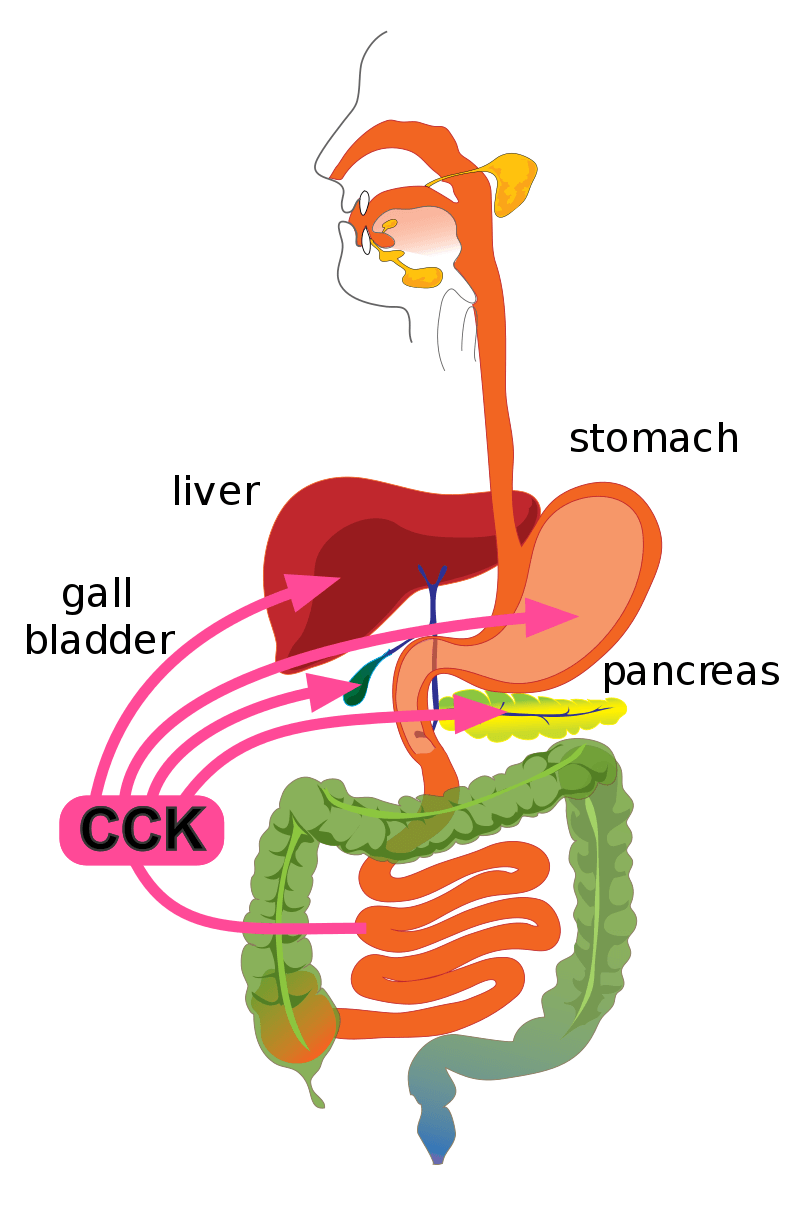Biologic Actions and Regulation of Cholecystokinin

Cholecystokinin (CCK) is a hormone that has an important role in the digestive process. Diverse studies have shown that it is actively involved in many metabolic pathways. Due to its pivotal physiologic role, cholecystokinin and its antagonists are widely employed in gastroenterology.
A Central Hormone in our Digestion
CCK, also known as pancreozymin, was discovered in 1928 (1). Synthesized by enteroendocrine cells in the duodenum of the small intestine, it stimulates the release of digestive enzymes and bile. CCK is a linear peptide hormone that is involved in the digestion of fat and protein by stimulating gallbladder contraction and pancreatic exocrine secretion. There are several forms of CCK that are composed by different quantities of amino acids (2).
Not only does CCK play a pivotal role in digestion, but it is also a hunger suppressant and is related to the increase of anxiety (2). Neurons of the enteric nervous system also secrete CCK. In fact, it is the most abundant neuropeptide in the human brain (3).
Mechanism of CCK Action
The release of CCK is triggered by the presence of fatty acids in a meal after it has been digested in the stomach and reaches the duodenum as chyme. Acetylcholine (a crucial neurotransmitter of the motor system), the monitor peptide (released by the pancreas), and the CCK-releasing protein (released by intestinal endocrine cells) also stimulate the secretion of CCK (3).
During digestion, CCK inhibits gastric emptying and activates the pancreas, which releases digestive enzymes that have a catalytic activity on proteins and fat in ingested food. Trypsin, a protease released by the pancreas, has a feedback effect on the secretion of CCK by hydrolyzing CCK-releasing peptide and monitor peptide. The production of hepatic bile, responsible for the emulsion of fat during digestion, is also stimulated by CCK activity. In addition, CCK dynamically acts with two other important hormones known as gastrin and secretin (4).
Employing CCK in the Treatment of Diverse Diseases
The use of protein purification methods has allowed scientists to comprehend the activity of CCK in different metabolic pathways. Today, it is known that CCK interacts with many receptors in the brain and the stomach and with the orexin neurons, which modulate appetite and sleep.
It has been seen that CCK may have trophic effects on epithelial targets and cancers. Protein purification methods have also contributed to the development of CCK peptide analogues with proposed therapeutic promise for both obesity and type 2 diabetes (5). Therapies that use CCK and the antagonists of selective receptor CCK1 are already used to treat pancreatitis, irritable bowel syndrome and Gastroesophageal reflux disease (6). Given that CCK is involved in many metabolic networks, more therapies with CCK and CCK antagonists will be developed in the near future to treat other diseases.
SOURCES:
- http://www.guidetopharmacology.org/GRAC/FamilyIntroductionForward?familyId=15
- Chandra R, Liddle R. Cholecystokinin. Curr Opin Endocrinol Diabetes Obes. 2007 Feb;14(1):63-7.
- Yule D, Lawrie A, Gallacher D. Acetylcholine and cholecystokinin induce different patterns of oscillating calcium signals in pancreatic acinar cells. Cell Calcium. 1991 Feb-Mar;12(2-3):145-51.
- Wang Y, et al. Amino acids stimulate cholecystokinin release through the Ca2+-sensing receptor. Am J Physiol Gastrointest Liver Physiol. 2011 Apr; 300(4): G528–G537. Published online 2010 Dec 23. doi: [10.1152/ajpgi.00387.2010]
- Pathak V, et al. Cholecystokinin (CCK) and related adjunct peptide therapies for the treatment of obesity and type 2 diabetes. Peptides. 2018 Feb;100:229-235. doi: 10.1016/j.peptides.2017.09.007.
- Peter SA, et al. CCK1 antagonists: are they ready for clinical use?. Dig Dis. 2006;24(1-2):70-82.
839GYLCCC1992



Leave a Reply